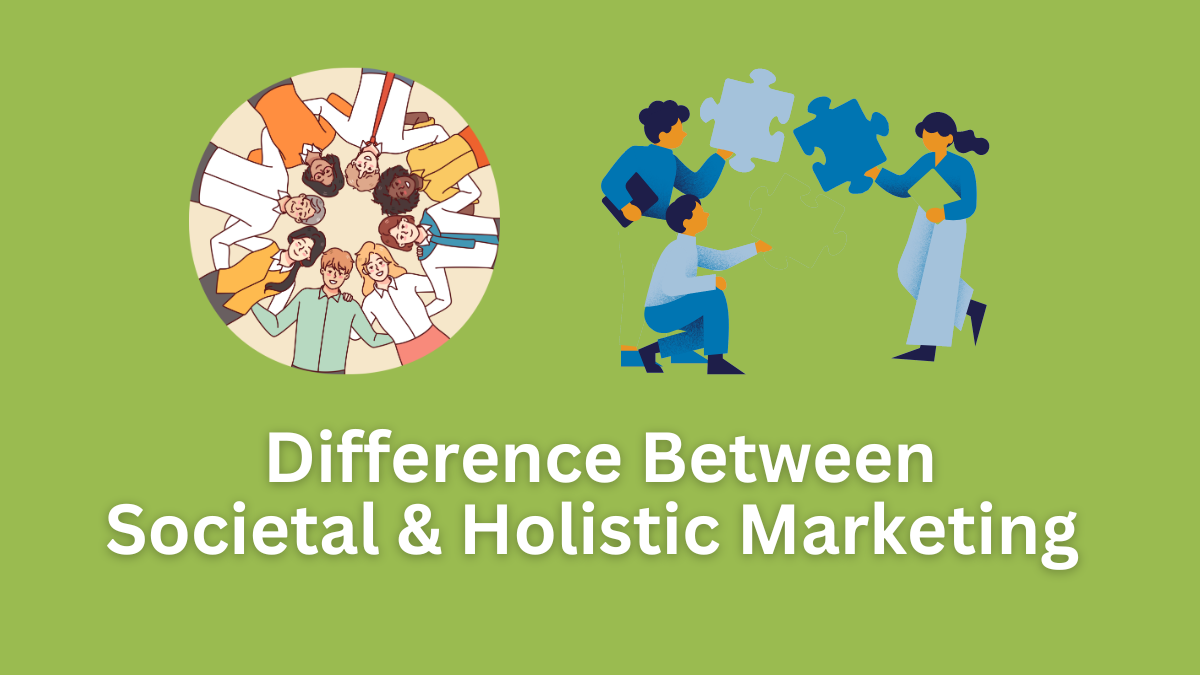Societal Vs. Holistic Marketing Concept
Societal and holistic marketing concepts are the two latest additions to the marketing philosophies. Both are important to succeed in today’s competitive marketing landscape.
The societal marketing concept is about generating profits for business while also addressing the customer’s satisfaction and social well-being. On the other side, holistic marketing works in a coordinated form and ensures every component of the organization is directed towards achieving a common goal.
In this article, we will understand the difference between these two – holistic and societal marketing concepts. So, let’s get started to know what the societal and holistic marketing concept is, and the differences between them.
What is Holistic Marketing Concept?
The holistic marketing concept holds that businesses’ success lies in the successful integration of all the components of the organization. It is about making marketing decisions considering all the aspects of the organization – while also directing all the component’s efforts toward the common goal.
Holistic marketing states that everything matters in marketing. Internal, integrated, relationship, and performance marketing are the key principles on which the holistic concept is based.
What is Societal Marketing Concept?
As the name suggests, the societal marketing concept holds the belief that for successful and long-term success businesses should consider social well-being.
Societal marketing states that along with profit generation, companies must consider fulfilling consumers’ needs (customer satisfaction) and welfare of the society.
In essence, the societal concept argues business success lies in the perfect balance between the desires of customers, the company’s goals, and the long-term well-being of society.
Related: 8 Pros and 7 Cons of Societal Marketing Concept
Difference Between Societal and Holistic Marketing Concept
Let’s differentiate between societal and holistic marketing concepts.
Focus:
Societal Marketing: Focuses on meeting the needs and wants of customers while also considering the well-being of society and addressing social issues.
Holistic Marketing: Focuses on integrating all aspects of a business to achieve marketing goals, including internal operations and external relationships.
Scope
Societal Marketing: Primarily emphasizes addressing societal concerns and creating positive social impact.
Holistic Marketing: Encompasses all departments, activities, and stakeholders of a business, aiming for coordinated efforts.
Purpose
Societal Marketing: Aims to create a positive image for the brand by showcasing its commitment to societal welfare.
Holistic Marketing: Aims to enhance overall business performance by aligning all elements towards a common goal.
Read Also: 8 Pros and 7 Cons of Holistic Marketing Concept
External vs. Internal
Societal Marketing: Primarily concerns the external image of the company in the eyes of the public.
Holistic Marketing: Encompasses both external branding efforts and internal coordination to ensure optimal performance.
Stakeholder Focus
Societal Marketing: Focuses on addressing the needs of customers, society, and other stakeholders.
Holistic Marketing: Involves creating alignment and cooperation among all internal stakeholders, including employees.
Social Responsibility
Societal Marketing: Puts a strong emphasis on ethical and responsible business practices that contribute positively to society.
Holistic Marketing: Considers social responsibility but also integrates various departments and strategies within the business.
Marketing Mix
Societal Marketing: Mainly influences the promotion and communication elements of the marketing mix.
Holistic Marketing: Impacts all aspects of the marketing mix, including product development, pricing, distribution, and promotion.
Related: The 4 Ps of Marketing Mix
Goal Alignment
Societal Marketing: Aligns the company’s goals with societal needs and ethical considerations.
Holistic Marketing: Aligns various departments and functions toward achieving common marketing and business goals.
Customer-Centric vs. Comprehensive
Societal Marketing: Puts customers’ desires and societal interests at the forefront of decision-making.
Holistic Marketing: Integrates all facets of the business, ensuring efficient operations and consistent customer experiences.
Long-Term vs. Multi-Dimensional
Societal Marketing: Focuses on building long-term relationships with customers based on ethical practices.
Holistic Marketing: Takes a broader approach, integrating all elements to ensure business sustainability and market success.
Read Next: Selling Concept Vs. Marketing Concept: 12 Differences
Arti Kushmi holds a BBS (Bachelor in Business Studies) degree and shares her business and marketing knowledge through this website. While not writing she will be reading and enjoying the moment.
